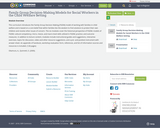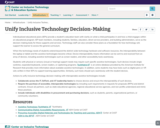Unify Inclusive Technology Decision-Making
Share:
Individualized educational plans (IEPs) provide a student’s education team with clarity on what a child participates in and how a child engages within an educational program. IEP team members, including students, families, educators, direct service providers, and building administrators, serve as the decision-making body for these supports and services. Technology staff can also consider these plans as a foundation for how technology will support the learner to access the general curriculum.
When the technology needs of students extend beyond the district-wide technology hardware and software resources, the interoperability between the laptop or tablet and the assistive technologies become critical. Device interoperability means information can be sent to and received from an array of devices, including assistive technologies such as screen readers, and other accessibility tools seamlessly.
Students with physical or sensory (visual or hearing) support needs may require such specific assistive technologies. Such devices include single switches, expanded keyboards, screen readers, or captioning programs. TechMatrix is an online database provided by the American Institute for Research that provides more information about available assistive technologies. In addition, some students may have tools such as digital pens or VR sets written in their IEPs to support learning opportunities. Similarly, such tools should sync seamlessly with the student devices.
Actions to unify inclusive technology decision-making with interoperable assistive technologies include:
Collaborate across the IT, EdTech, and AT leadership teams to choose devices and ensure the interoperability of such devices.
Require the purchase of accessible, interoperable technologies by including such requirements in requests for proposals (RFPs) and district contracts. Ensure all partners, such as state educational agencies, regional educational service agencies, and non-profits understand and mimic these practices.
Include individuals with disabilities in procurement and purchasing decisions, such as students, parents, organizational partners, or community volunteers.





